We are in a new golden age of cybernetic revolution. From television and film, down to the humble pages of a comic book, the interest in seeing the ramifications of humanity’s hubris when it comes to artificial creation is at a peak level. But where to go from here. Too often, the underlying philosophy of such work gets muddles by too many theories of purpose and consequence. Where is the ability to just sit down and enjoy a thrill ride without much of the background chatter to get in the way?
Luckily, there’s a new cyborg in town, and she is here to kick ass. Not too long ago, I had the opportunity to chat with Bryan Edward Hill about his future-neo-noir-action comic Aphrodite V (Top Cow) and how it fits into the milieu of ersatz humans going against their progenitors. Like the book itself, our conversation is jam-packed with plenty of humor, serious reflections on the current state of America with regard to race and gender, and some musings about where we are headed as a society as a whole. Buckle up… it’s a wild ride!
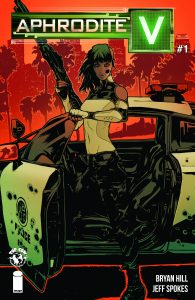
You begin Aphrodite V with a philosophical argument about the future of police work in the specter of a terrorist attack. In the current climate of policing in America (some might say over-policing), how do you as a writer—and citizen—navigate between telling a compelling story while commenting about the current state of American society?
BRYAN EDWARD HILL: Thanks for taking the time to chat. To your question, the concept of the privatization of law enforcement can be seen in 1980’s films like ROBOCOP, Mamoru Oshii’s GHOST IN THE SHELL, etc. I imagine, with Elon Musk, we’ll be revisiting this notion soon. If you look at the cover to issue one, you can see the obvious nod to Paul Verhoven’s ROBOCOP. I just traded Detroit for Los Angeles because Los Angeles seems the kind of city where evolution comes with explosions. Maybe it’s all the Tony Scott and Michael Mann and James Cameron films I loved growing up, seeding their perspectives into my mind.
We’re already seeing plans for the privatization of the prison system sneakily moving through the news and the federal government. Corporations, by design, are constantly looking for profit expansion and there’s a lot of potential profit in law enforcement contracts. Now, that SEEMS a radical thing, but when you add the component of fear into the equation, then radical solutions seem more like pragmatic ones. The Patriot Act comes to mind, as an example.
When people are confronted by seemingly random and terribly destructive violence, it unsettles something deep within the psyche. Terrorism works, not based on the event of it, but based on the fear of the NEXT event. The violence in narcotics trafficking, for instance, is easy for most to ignore because we have familiarity with its causality. We see it, and we say “well, I’m not in that world so it won’t affect me.” Terrorism is the opposite of that. It’s ideological violence with NO direct causality. It’s a boogeyman, by design.
It’s psychological warfare meant to destabilize our sense of security and the response to that destabilization can be incredibly damaging. Human beings will do just about ANYTHING to feel safe once their sense of safety is removed. Now, I tend to think we confuse safety with comfort a lot, but that’s another discussion.
I grew up around a great deal of violence, so I’m likely a little desensitized to it, or at least it takes a direct threat to my life to make me think about self-preservation. I’m a fella who reads The Hagakure often, the book of Bushido philosophy so I’ve long made peace with my own mortality, but our society is built on avoiding mortality at all costs. Samurai took time to reconcile with their mortality, to be prepared to die and I find that philosophical work liberating. It leads to a life with less fear, and for me, life is about defeating the influence of fear whenever possible.
Being said, I see the real possibility that corporations could make a charismatic pitch to privatize services like law enforcement, and I see the potential good and potential harm in all of that.
As for storytelling, every work is a reflection of its times, whether intentionally or not. As a writer, you’re going to absorb the world around you, have feelings and thoughts about it, and it will show up in the text. What I try to do is avoid the “soapbox.” I genuinely believe in the battlefield of ideas, so I never lionize one point of view over another in my stories, but I’ll present points of view with equal gusto and let the reader decide how they feel. Do I have my own opinions about America and its struggles, successes, and failures? Certainly. Everyone does. Opinion is the fastest growing commodity in entertainment, for better or worse.
This is a story about a killer robot protecting Los Angeles from more dangerous killer robots. Hopefully, my work is thoughtful enough that one could glean greater meaning from the text, but rather than spell it out here, I’d rather people read it and came to their own conclusions (and they can yell at me on social media later, hahahaha).
FROST: Can you tell us about the character of Martin Carver, a self-described “millennial…gay, black billionaire with 195 IQ.” What does his character say about racial and generational realities of the world he occupies? And taking a step back, what does Martin’s position as a lead character in a comic say about the current state of comics?
HILL: Well, Martin is an asshole. He’s a well-meaning asshole, but he’s still a pompous ass that’s full of hubris and genius in equal amounts. I wanted him to be a three-dimensional character that you might not like very much (or you might like him a great deal, reader’s privilege) but he’s not a saint, nor is he defined by his race or sexual preference.
The quote you’re referring to happens in a moment where he’s trying to get Aphrodite V to understand that he gets “being different.” It’s not at the forefront of his mind all the time, his identity, but in that moment he’s using that as a gateway to try and unlock this mystery of a woman who’s crashed into his world. What that moment says about his character is that he uses tactics in conversation, to get what he wants. That can be effective, but it’s also highly manipulative which, in my experience, most ambitious geniuses are.
As for racial, generational realities and the state of comics…hmm. I think it would be arrogant and presumptuous of me to assume that THIS story has something important to say about either. We’re in an age where everything is put into some kind of camp, some kind of ideological tribe that goes to war with opposing ideologies, and I get it. That’s human nature, but my work is ALWAYS centered on the unique aspects of the individual characters.
No one in a Bryan Hill story is symbolic of anything. They’re all individual characters, with their own wants, needs, flaws and virtues. It’s just my opinion, but I think a writer can get into some trouble when their characters are willfully made into symbols because it’s human nature to protect the symbols we identify with and demonize the symbols that we believe are opposed to us. When you’re PROTECTING your characters, you’re FAILING your story. That’s my core belief. Often times it’s well-meaning, but I find it creatively stifling. I suppose, if one were a satirist like Chaucer or for a more recent example SOUTH PARK, then characters as symbols makes sense.
I’m not a satirist. I’m a MYTHOLOGIST.
Some things are both myth and satire. I’d say the original ROBOCOP falls into that camp. You can read it as a satire of the Reaganite 1980s, or you can read it as a hyper-violent, Christian allegory, or you can read it as exploitation, trivial action cinema. I think it works because all of those definitions apply, but none of them eclipses the core narrative.
I write modern myths with a few goals: exploring ethics, heroism in the face of adversity, and demonstrating both the heroic power and the potential destruction in the application of human will (or in the case of APHRODITE V, humanoid will).
I’ll leave it up to smarter people than me to determine what my work symbolizes for popular culture. I really enjoy reading people analyzing my work. It’s always humbling when it happens, even when they think I’m an idiot. HAHAHAHAHA. At least, I’m an idiot they find worth the time to criticize.
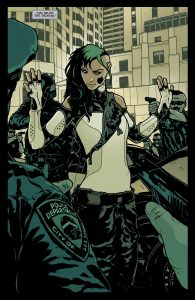
HILL: Oh, we’re wading into it now, aren’t we? HAHAHAHA. Okay. I’m game. I try to base as much of my work, as I can, on real-world experience. When you’re writing about assassin robots, that’s a tricky proposition. In this case, I spoke with some friends of mine, women, that work in private security. Because I tend to write about kinetic, ballistic violence, I train a bit in light arms, just to know how it feels to use the weapons I write about in my stories. I’m not a nut over firearms or anything, but early on, I decided I would demystify them and have some personal experience so I go to a local gun range, here in Downtown LA, on a semi-regular basis. Some of my female friends in private security have taught me techniques with weaponry and I’ve had conversations with them. For them, EVERYTHING has a tactical purpose, including their appearance. We make snap judgments about people based on their appearance, as unfair as that may be, it’s a fact of the species.
What Aphrodite says in the book is based on what they’ve told me. Friends will joke with me and tell me how I would be TERRIBLE in covert ops because I’m a 220 lb guy with a voice like an elephant’s bellow. If you’re worried about potential threats, then I’m the guy you kill FIRST, hahahaha. I look like trouble on two legs. I’d be a horrible assassin. I was a good club bouncer though, so there’s that. But that’s another conversation. Anyway…
Aphrodite was built to be covert. Tremendous, destructive power housed in an appearance that could belie the existence of that power. We have a society with some false polemics/paradigms in play, namely, beauty is in opposition to strength. When you think about it, of course, that’s silly, but at a snap judgment, we tend to think that beautiful people aren’t very tough. The organization that created Aphrodite used her appearance to take tactical advantage of that.
However, if you notice, Aphrodite willfully rejects the “mannequin doll” aspects of her creation and she LOOKS dangerous. This story is about her discovering her own identity, apart from the intention of her creators, and the way she owns her appearance and rejects the intention of her appearance is part of that. Aphrodite is indifferent to her appearance, on an ego level. She takes no self-esteem from it, but she recognizes the effect it can have on other people. Personally, she couldn’t be less interested in her “beauty” but she’s a realist about what beauty offers in society. That’s a bit of a page from Oshii’s GHOST IN THE SHELL. One of the fascinating things about Motoko Kusangi is how she seems completely disinterested in her own body. It’s clear, in the OVA, that it’s just a tool to her and without hesitation, she’s willing to destroy it in service of her goal. In a world where we can all be obsessed with appearances, that perspective is rare and interesting to me. It speaks to a self-esteem based entirely outside of your sense of your physical being. GHOST IN THE SHELL is a story about the enduring power of consciousness. It’s anti-material science-fiction and I suppose APHRODITE V is as well.
I think strength is sexy. I think determination is sexy. I think personal certainty is sexy. There’s nothing wrong with sexiness in a character or a comic book, but for me, it has to be rooted in the character and not just a by-product of the aesthetic design.
Speaking of, JEFF SPOKES, the artist of the series, did a PHENOMENAL job of designing Aphrodite V and her world in such a visceral, passionate way. Science-fiction can often be cold, trapped by its own aesthetics, made clinical. Jeff’s work is fury on the page and I love it.
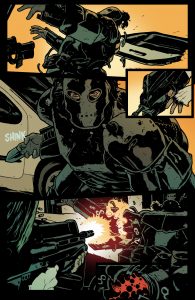
HILL: Like any science-fiction fan might, I’ve read Ray Kurtzweil and lost sleep for a few weeks. Despite that, I think the debate about artificial consciousness and biological consciousness, the Mary Shelley dialectic about humanity making its own Gods, all of that is pretty well-worn, by now. APHRODITE V isn’t really about that. I have a very simplistic view of consciousness. If something appears to have one, I’ll treat it like a sentient life form.
And as Optimus Prime said, freedom is the right of all sentient beings.
This is a story about machines and creators, but it’s more about what happens when ambition creates something that refuses to be contained. It’s about how the sins of the past visit our present.
Most of all it’s about APHRODITE V choosing what her purpose is and defining herself outside of the intention of those who created her.
FROST: As readers work their way through the series, what do you want them to leave with? What is the long game here?
HILL: My goal with APHRODITE V was to create something with the same intensity as the genre fiction I loved growing up, and to tell a story about what I believe: that YOU define your purpose, no matter what circumstances brought you into this world.
I want readers to realize the power they have, in their own lives, to be WHATEVER they want to be, despite a world that might tell them they have to fit into a standard.
I admire APHRODITE V. I admire her will and her ethics and the responsibility she places on her power.
FROST: Thank you so much for taking the time to chat!
HILL: Thank you!
Aphrodite V will be released on July 18.


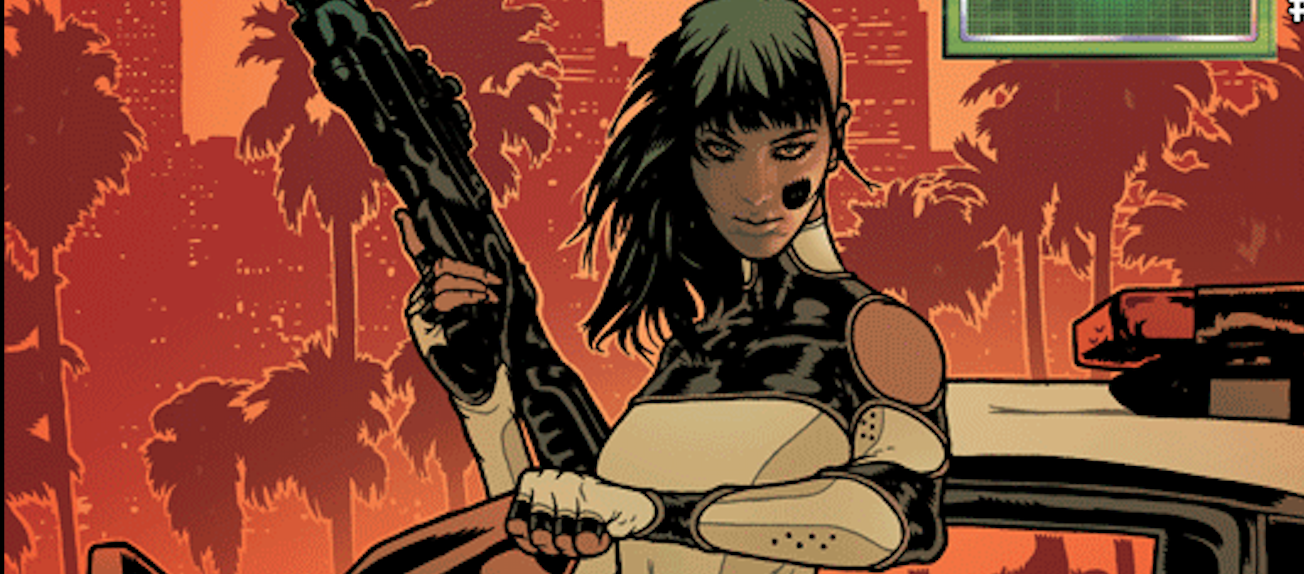
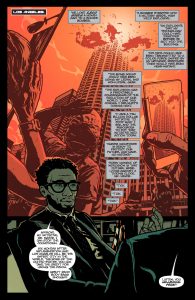



Nice interview. Seen these at the library, gonna have to try them now.
Comments are closed.